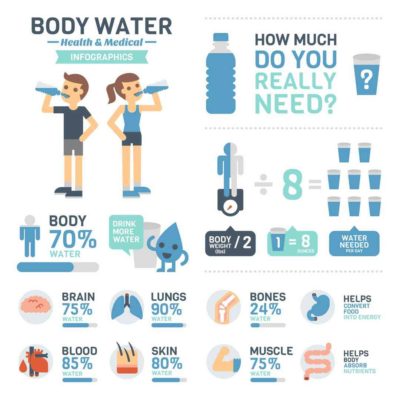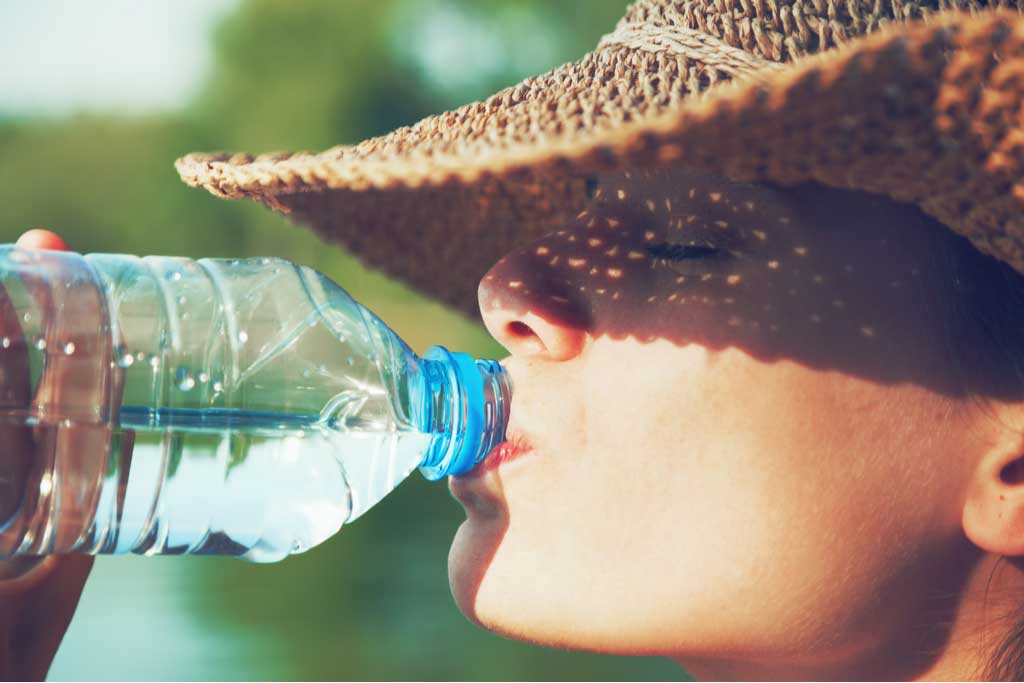Drinking enough water as the summer heat is upon us is important whether you’re playing sports, gardening or just sitting in the sun. When considering your body’s nutrition one of the most significant components is remembering to stay hydrated to maintain your overall health. Climate, physical activity and diet are all factors that might lead to a water deficit.
Drinking fluids is crucial to staying healthy and maintaining the function of every system in your body, including the heart, brain, muscles and digestive system.
Water is an Essential Nutrient

Water is considered one of the most essential nutrients because it is required in amounts that exceed the body’s ability to produce it.
Think of water like the transmission fluid in your car: When you’re well hydrated, the water inside and outside the cells of contracting muscles provides nutrients and removes waste efficiently so you perform better. Water helps muscles move more efficiently, lubricates joints and ensures your organs function properly. Water is critical for your heart health. Keeping the body hydrated helps the heart more easily pump blood through the blood vessels to the muscles.
Water is a major constituent of the body: 60-70% of your body weight is made up of water. Water moves throughout cell membranes from the blood to the lymph system, to the organs, and to the brain. Water is needed to transport vital nutrients like minerals, vitamins and amino acids to cells and extract waste from every cell. Water also affects the efficiency of the nervous system and plays a role in cerebral blood flow.
Who is at Risk for Dehydration?
Dehydration is always a risk of disease and aging. As we age, the body’s mechanism for signaling thirst and distributing water to the cells becomes compromised. In the United States, dehydration is responsible for 1.8 million days of hospital care each year and costs more than $1 billion annually.
Those at an increased risk for dehydration include:
- Young infants and elderly people are at greater risk for dehydration.
- People with swallowing disorders caused by stroke, Parkinson’s disease, or dementia.
- Patients with five or more chronic diseases and those taking five or more prescription medications.
- People who are over 85 years old, are bedridden or obese, or experience diarrhea, vomiting, or excessive sweating.
Dehydration Health Risks
When an individual has long durations of dehydration, cells lose the ability to function properly and die, which can lead to degeneration and disease. Dehydration can lead to poor circulation and blood flow, potentially leading to organ failure, kidney failure and high blood pressure.
Dehydration can affect consciousness and can induce speech incoherence, extremity weakness, and tachycardia (heart rate over 100 beats per minute).
Tips for Staying Hydrated
Once you have signs of thirst it’s likely you already are dehydrated. Other symptoms include fatigue, dizziness, headaches, eye strain, blurred vision, dry mouth or skin, and muscle cramps. Losing electrolytes from dehydration caused by sweating, vomiting or diarrhea can result in muscle spasms throughout your body, including your stomach.
Your body requires approximately 2 quarts or just under 2 liters of water per day. To maintain proper hydration, adults are recommended to drink 6-8 glasses of water or fluids per day.
Drink water first when you’re feeling hungry. True hunger will not be satisfied by drinking water. Some research suggests that drinking water can help you feel full and contribute to a healthy weight-loss plan.
The skin pinch test is an easy way to tell if you need more water.
Here are some tips for incorporating more fluids into your diet:
- Think Morning, Noon and Nighttime. Have water first thing in the morning and right before bed.
- Drink water with every meal or snack at home or at a restaurant.
- Drink water before, during or after a workout.
- Consider limiting fluids that have a diuretic effect, including alcohol, caffeineA crystalline compound that is found especially in tea and coffee plants and is a stimulant of the central nervous system., high protein drinks and hot liquids.
- Consume foods with high water content, such as watermelon, oranges, cantaloupe, cucumber, celery, tomatoes, cabbage and spinach.
- Use a straw.
- Set a timer on your phone at specific intervals as a reminder to drink fluids.
- Add lemon, lime, orange or cucumber slices, a splash of juice or water flavoring for flavor.
- Line up cups on the counter to use throughout the day as a reminder.
Find out about Good Medicine Choice Network’s line of natural immune defense vitamins and supplements designed to promote healthy immune balance, anti-aging, weight loss, and focus and energy.


No comments yet. Be the first one to leave a thought.